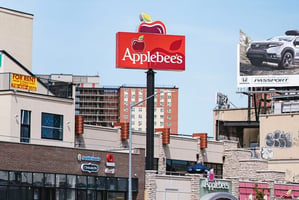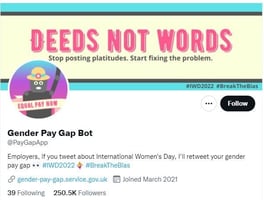Imagine the scene.
During this time of global crisis, many brands have been thinking of ways they can help out and show social responsibility.
Nike, for example, recently announced it was donating 30,000 trainers to healthcare workers. Deliveroo has been giving thousands of NHS workers a free meal as part of a campaign to say ‘thank you’ to frontline staff. And Tesco has unveiled a £30m support package to its ‘charity partners’.
Another example of corporate good intentions saw a clothing company offer to say thank you to teachers working during the lockdown by offering them a free dress.
Sounds great.
So, why did it end up putting the brand in crisis mode, facing a string of horrible headlines and negative social media posts?
The offer was made by a company called Draper James, which was founded by Hollywood actress Reese Witherspoon.
At the start of April, it posted a message on its Instagram account, which said: “Dear Teachers: We want to say thank you. During quarantine, we see you working harder than ever to educate our children. To show our gratitude, Draper James would like to give teachers a free dress.”
The announcement did say that ‘winners would be notified’ and included an application form and said that the offer was ‘valid while supplies last’.
The post went viral and the brand received more than one million applications.
And that is where the problems began. Draper James only had 250 dresses to give away, leaving a lot of disappointed applicants. The giveaway was hastily repositioned as a raffle and those who were not successful were offered a 30 per cent discount and the chance to unsubscribe from the company’s mailing list.
This triggered a furious backlash. Not only were many applicants frustrated at not receiving the free gift they had applied for, but some felt they had been duped into handing over personal details so the brand could grow its mailing list.
Here is a selection of the resulting headlines:
The social media reaction was equally damaging.
Hi Draper James, I am a teacher and I signed up for the free dress “thank you” offer. Instead I get an email offering me 20% and then 30% after I called you out on your lousy marketing. #draperjames #ReeseWitherspoon @draperjames @ReeseW
— Jessica (@JessicaRobot) April 7, 2020
Love how Draper James was all “a free dress for teachers” but then took it back when they saw the actual numbers. Did the marketing team think there were only 4 teachers in the whole country? 😂
— ntflxandcats (@ntflxandcats) April 5, 2020
I'm not super upset, more so annoyed. It seems it was poorly executed and more about the marketing than celebrating/rewarding teachers. Unsurprisingly, I didn't win. I won't be shopping at Draper James any time soon. https://t.co/L5CzUQXuoe
— LeAnn Smith (@MsSmithEngTeach) April 20, 2020
Ms Witherspoon has subsequently donated to a charity that helps teachers to continue to educate despite schools being closed in an apparent attempt to manage the fallout of the debacle.
But the damage had already been done.
So, what can be learnt from this dress mess?
You never know when a crisis might strike
When Draper James decided to join the coronavirus conversation and launch its giveaway, it is doubtful it considered that it would result in a social media backlash and damaging headlines.
But, even good intentions can force a brand into crisis media management mode.
How would your organisation cope if it found itself in the firing line at the current time? Could your crisis team respond remotely? Do you have spokespeople who could carry out interviews remotely?
Have parts of your crisis team be placed on furlough leave?
This story should be used to review your crisis plans and make sure they still work in the current landscape. Crisis communication can be carried out remotely while social distancing restrictions remain in place.
Coronavirus link
Coronavirus is obviously dominating the news across the globe.
And that means that anything with a coronavirus link is likely to be considered newsworthy.
Draper James decided to enter the coronavirus conversation with its promotion for teachers. Initially, that resulted in positive coverage, but it also exposed it to more risk if things went wrong.
Another brand that recently found how risky it can be to have a story linked to coronavirus was Frontier Airlines in the US.
It announced that from May 8, passengers could reserve a ‘more room’ assigned seat on its flight. This would guarantee them a middle seat between them and another passenger.
This came at a fee and the company found itself accused of trying to profit from the crisis by charging passengers to socially distance on its flights.
Following a backlash, it decided to pull the fee.
Corporate social responsibility
Many brands have been considering how they can help during this global crisis.
And, although there needs to be some urgency to this, the consequences need to be carefully considered before this activity is launched.
Get it wrong and your initiative is likely to be seen as a cynical marketing ploy or as an attempt to profit from the crisis.
And both those outcomes could result in lasting reputational damage – consumers will remember how brands acted during the crisis.
Get in touch with your account manager to find out more about how we can help you with your internal and external communications challenges. Our bespoke, training by videoconference can help you deliver better interviews, refine and test messages and ensure you are best prepared to face a crisis.
Media First are media and communications training specialists with over 30 years of experience. We have a team of trainers, each with decades of experience working as journalists, presenters, communications coaches and media trainers.
Subscribe here to be among the first to receive our blogs.




